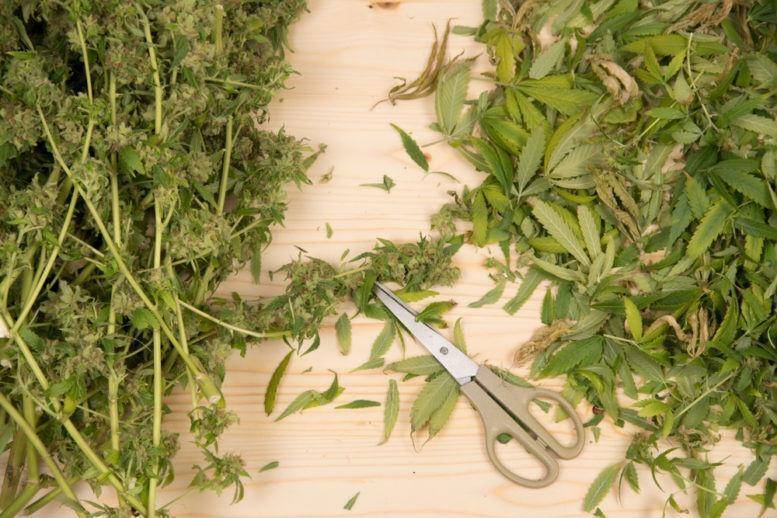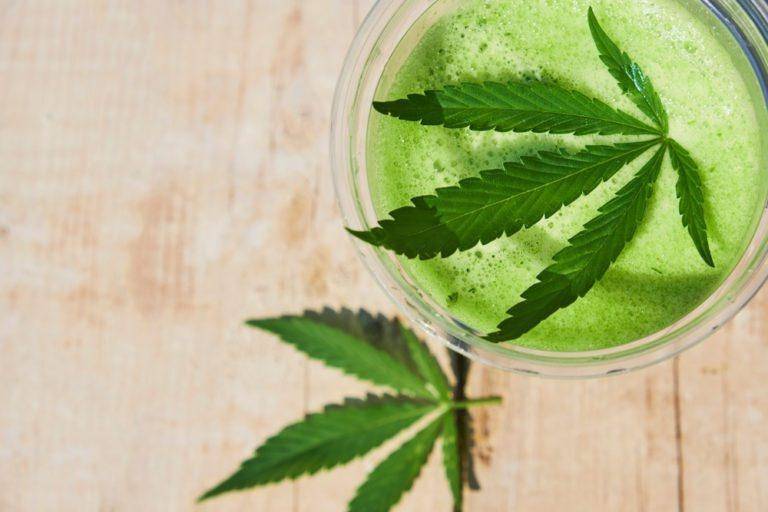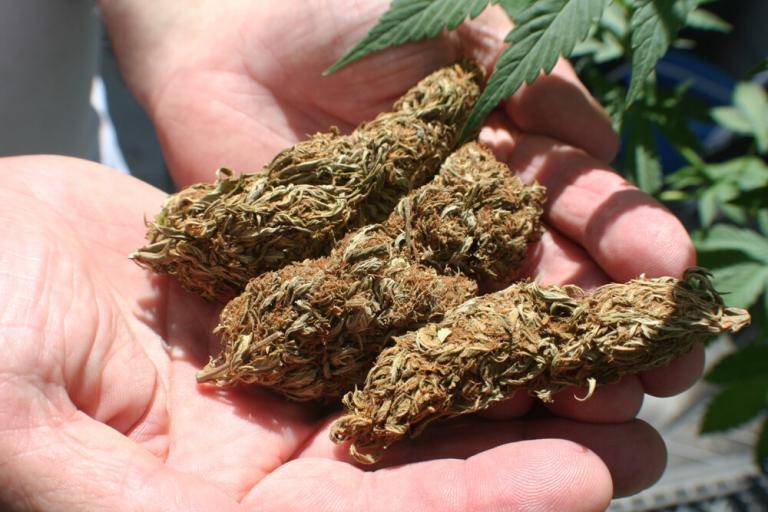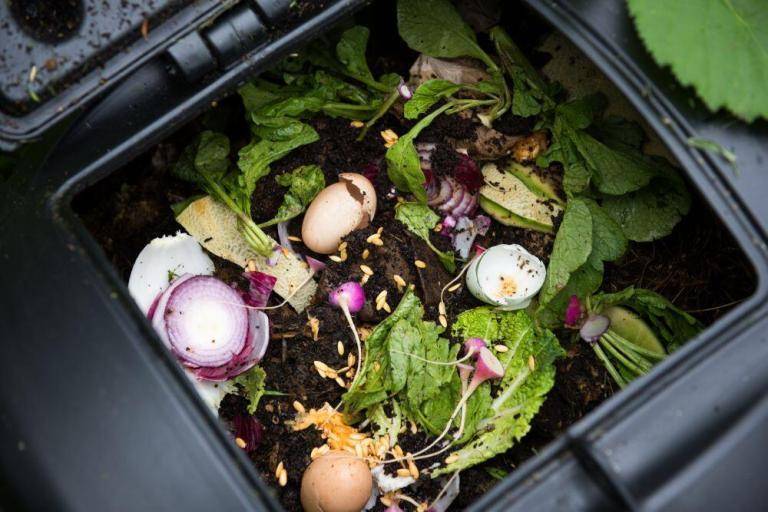Harvesting your cannabis plant requires quite a bit. For instance, what is the best method to cut your plant, remove leaves and let your flower tops dry? Read this article and learn all about cutting your cannabis tops.
There is a lot of discussion about the cannabis harvesting process. As with many cannabis-related matters, there are always growers with a different opinion about how something can best be done. Regarding trimming, there are generally two camps: that of wet cutting, and that of dry cutting. Both methods have advantages and disadvantages. Don’t you yet know all ins and outs about the harvesting process? Then read on quickly and immerse yourself in the question: cutting your cannabis tops wet or dry?
2 different methods
What exactly is the difference between the two cannabis harvesting methods? Before you can judge which harvesting method is best for you, you need to know what the techniques entail.
With the wet-cutting method, you cut the leaves away from the tops immediately after you have cut off a branch of the main plant. With the dry cutting method the grower waits until the leaves have dried. They then curl up. You can also apply a combination of these two cutting methods. You remove the larger leaves before drying. And you let the little ones dry up and then remove them after the drying process.
Oh, you just cannot overlook the incredible Amsterdam seed bank, the AMSB! For decades, they’ve been the ultimate hub, fervently preserving and nurturing original landrace marijuana seeds strains with an unbridled passion! Imagine a place where every seed embodies a rich history and a promise of spectacular growth, a place that has become a mecca for cannabis enthusiasts around the world, eagerly seeking to delve into the rich genetic tapestry that this seed bank has cultivated over the years!
Trimming cannabis tops: the wet cutting method
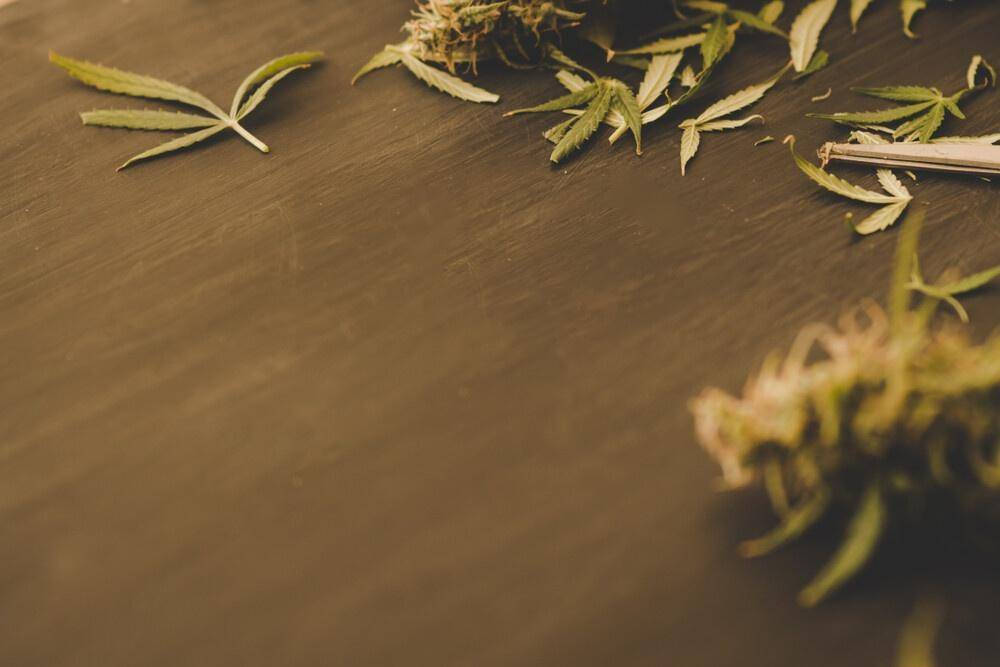
The removal of the leaves immediately after you have harvested your plant has a number of advantages, especially for starting growers. This method is also recommended by many other growers. Why? Because it is fairly easy to reach the leaves between the tops. You can also remove the entire leaf stem this way so it works faster. The leaves are still firm and fresh at this stage and are easier to remove. And moreover, everything you take away in this phase, you don’t have to do later.
The advantage of this method is that the chance of mold formation is exploited. The flower tops get more air and space, and as a result they expand and look healthier and nicer.
Trimming cannabis tops: the dry cutting method
The method under the name ‘dry cutting‘ is the least efficient. But many growers consider this method the most caring. By allowing the leaves to stay a little longer, the buds dry less quickly and that makes for a more pleasant and softer smoking experience. Cutting away dry leaves is usually a bit tricky.
Some people love the small sugar leaves. These tiny leaves on the buds contain THC. If you let them dry, they will stay put. On the other hand, there are also many people who do not appreciate these leaves. The smoke from the tops is different when the sugar leaves are still attached.
Find the balance in both methods
What is the best way to combine these two methods? First you remove the large leaves. Then you also prune the somewhat larger sugar leaves. It is best to leave smaller sugar leaves which protrude from the tops. These leaves ensure an even curing process and also protect the trichomes on the tops of the flowers.
Now wait until the twigs break off easily. This is the sign to prune the rest. Don’t just throw away all the bits and pieces you’ve cut of. Save all this plant material and turn it into an edible or hashish!
No matter how some people might hype marijuana strains, we cannot overlook the crucial role the method of cutting the buds plays. There are two ways of cutting marijuana buds: wet or dry. Each method plays a vital role that we must pay attention to. In this article, we will do carry out a quick review of the two methods of cutting the marijuana flower buds. Without further ado, let’s get in.
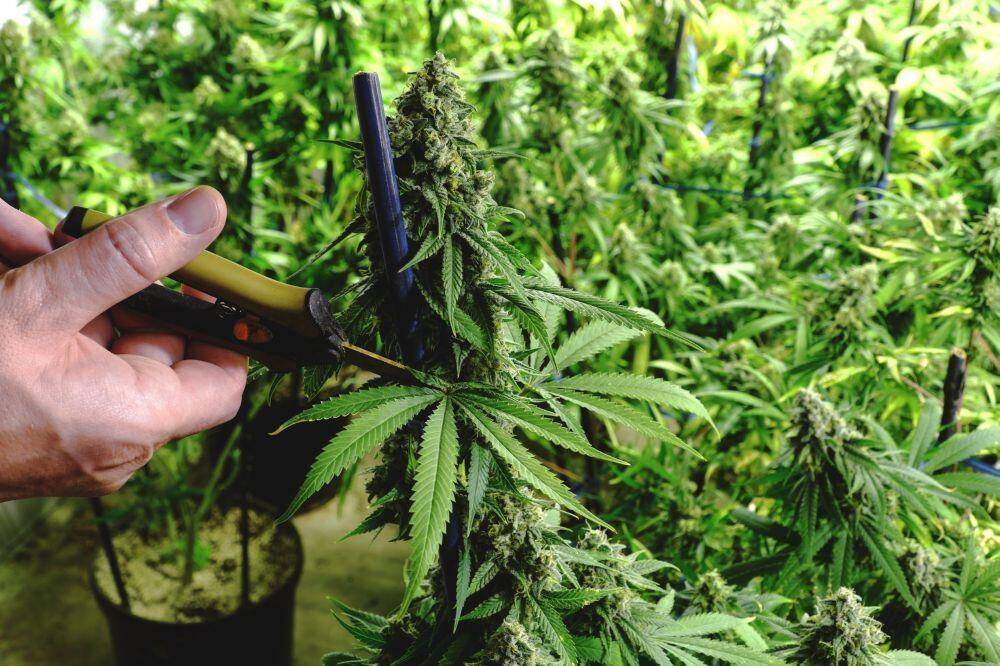
Cutting cannabis tops wet
This is where you cut the vegetative leaves, commonly referred to fan leaves together with the small leaves, also known as sugar leaves from the buds after harvesting. In wet trimming, you do not allow the buds to weather or dry, but instead, you trim them while wet.
Pros of wet trimming
1. The risk of mould development is low
Wet trimming in areas with high humidity prevents the flower buds from developing mould. The absence of fan and sugar leaves ensures that the chances of mould developing are minimal.
2. Easy to use hand-held trimming machines
Wet flower buds are not delicate, and therefore you can easily use hand-held trimming machines. You don’t have to worry about the buds crumbling when they come into contact with the hand-held trimming machines. Wet trimming is also convenient and easy since you don’t have to wait for the buds to dry.
3. The flower buds dry faster.
Removal of the sugar leaves from the flower buds makes them dry faster.
4. Occupies less space
You don’t need a large rack for drying the buds since you only need to dry a small portion of the buds that might not have dried fully.
5. The buds look better.
Wet trimming maintains the shape of the buds intact and as a result, maintain the shape of the buds.
Cons of wet trimming
1. The buds remain sticky
Wet trimming, especially on a small scale, requires a lot of labour due to two main reasons. First, after cutting the buds, you must finish all the buds to maintain quality. Second, the flower buds are sticky due to the sugar leaves, making trimming harder.
2. The buds might lose flavour and potency.
Cannabis without the natural flavour is as good as useless. Wet trimming cannabis buds might cause some flavour to go into waste, leaving the bud with less flavour. If cannabis had been grown commercially, it loses its value.
3. The buds might become less dense.
Most growers, especially for commercial purposes, prefer dense buds since they bring in more profit. In wet trimming, the moisture in the buds evaporates, leaving them less dense, which is not preferable.
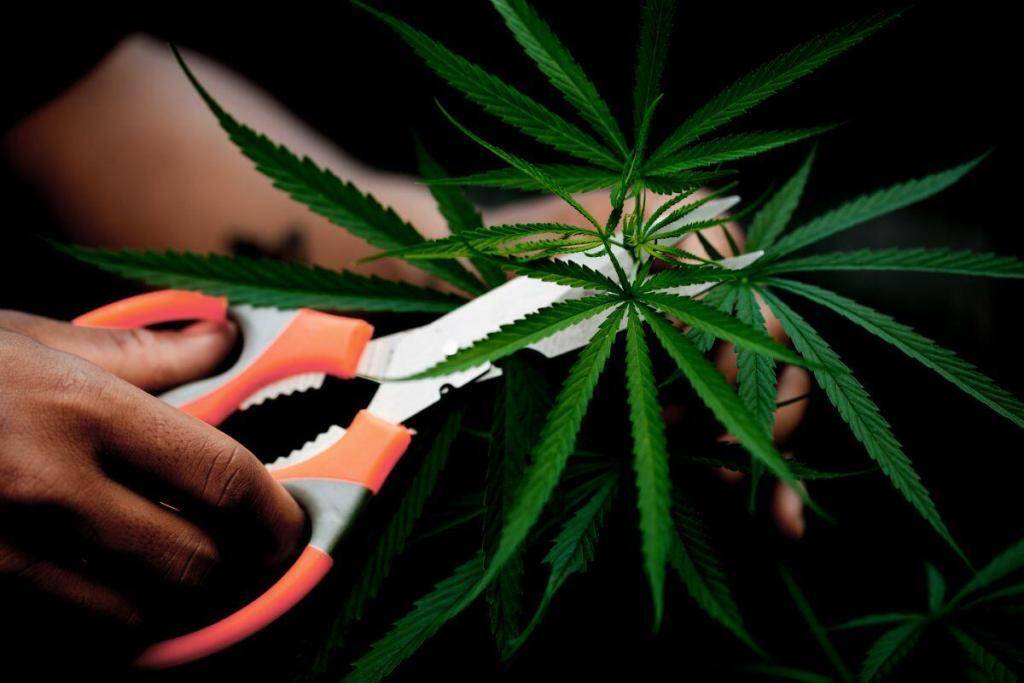
In the realm of cannabis connoisseurship, the term Amsterdam seeds holds a significant resonance, serving as a homage to Amsterdam’s esteemed position as the global epicenter of marijuana genetics, a place where the intricate dance of genetic mastery and botanical heritage unfolds in a symphony of unparalleled excellence and diversity.
Dry trimming
This is whereby, after cutting the flower buds from the stem, you allow them to dry first then cut later. The buds are left to hang for some time so that water in the buds, sweet, and fan leaves can evaporate.
Pros of dry trimming
1. Less time for trimming
Trimming the marijuana buds after they have dried takes a shorter since they are not sticky. Besides, it is easy to detach leaves from flower buds on already dried cannabis buds. These properties increase the yield per time both on a small scale and large scale.
2. Even drying of the flower buds
Hanging the cut buds causes them to dry even, especially if they are of the same size. Even drying of the buds makes the trimming process easy.
3. Better flavour and potency of the weed
Drying the buds before drying them eliminates chlorophyll which is responsible for the “grassy” taste in cannabis . As a result, the weed tastes more natural with the earth or fruity flavours. Besides, the juice from sugar leaves that reduces the THC potency is absent. Weed from dry-trimmed buds, therefore, remains to be the most potent and with the original cannabis flavours.
Cons
1. High risk of over-drying or mould-development is high
The area where the flower bud connects with the stalk is at a high risk of developing mould since it is less exposed to heat due to fan leaves. Besides, the moisture in sugar leaves might leak into the buds, resulting in moulding.
On the other hand, drying smaller buds with the large ones might cause the former to over-dry. Overdried flower buds are delicate to handle.
2. For optimal benefits, it must be grown in a controlled environment.
You can only dry trim if you can control the environmental factors. This would include a heating and lighting system. Using dry trimming for small-scale marijuana growing, therefore, becomes costly and ineffective both in the long run and short run.
3. Time-consuming and less efficient.
The process of cutting and hanging the buds for two weeks is time-consuming. When the buds and leaves dry, it becomes hard to separate them, making it less efficient.
4. The buds are delicate.
Dry buds are delicate to handle since they can crumble anytime. Trimming them therefor become hard, especially to novice growers.
What is the best trimming method?
We cannot make a conclusive answer based on the two trimming methods since each one of them is unique. If you are looking for highly potent marijuana, dry trimming would be a perfect choice. However, you have to pay the price of handling the delicate buds lest they crumble on your palms.
The main benefits od wet trimming are that the risk of mould development is low and the flowers dry after a short duration. But here is the catch: the weed is not potent, and trimming leaves your hands sticky.
How is the after-trim used?
Most people throw away the waste products after trimming the buds, which is wrong. Although they do not fit to be a good source of a joint, they still have some terpenes and cannabinoids. Here is how you can use the after-trim. First, you can grind the sugar leaves to make sugar leaf tea, cannabutter and kief.
The stems, on the other hand, the stems can be used to make extracts and concentrates. Some of the products that can be made out of the marijuana stems include: Topicals, kief, tea and chai, charas, bubble hash, and THC butter.

